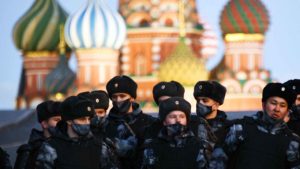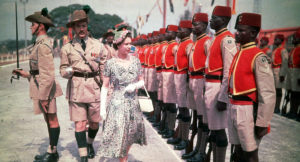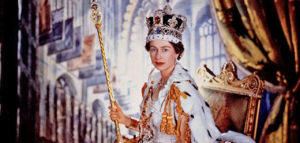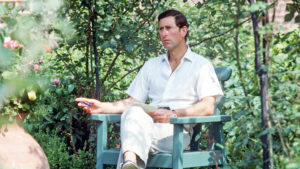Queen Elizabeth was the last revered European monarch. There are a few other Konigs and Reines in Europe, flying part-time as KLM pilots, cycling on their own to official occasions or forced to abdicate because of garden variety corruption. These are men and women afraid of their own shadows. They might not even be recognised by a few of their fellow countrymen.
There was something different about Elizabeth II. Millions treated her with a hint of the divine right of kings, a woman who lived above interviews, who loomed over her own society mysteriously, with more in common with Franz Josef or the Romanovs than her own son.
This is the end of that story. The remaining royals of Europe are anachronisms, whether they are beloved or not; whether they are effective at their constitutional roles or not. This is the end of something which began on Christmas Day in 508, with the baptism of Clovis, which was the true start of sacral European Kingship. The story of a once Germanic warrior aristocracy that conquered and ruled Europe for over a thousand years, after the barbarian invasions that finished off the Roman Empire. Their demise from Paris to St Petersburg — as a sociology, as a political faith, as a simple fact — has been the story of modernity.
This end was first noted by the Bavarian nobleman Count Albrecht von Monteglas in 1917, when he decried that the house of Saxe-Coburg-Gotha, with a thousand-year history, changed its name to the pedestrian Windsor “for a mere war,” the true age of European monarchy was over. The democratic age had arrived. That great flattening force seen so clearly by de Tocqueville in America, had come home to the old world meaning — not even a Hapsburg, let alone a Hohenzollern, even a Windsor — would serve without the implicit consent of the governed.
Queen Elizabeth’s death marks the latest step away from divinely ordained monarchy, towards something else. No longer sacred, the European monarch would rather be a pilot, or a country gentleman interested in urban planning. Another step along the path we have travelled since the laying of hands on His Majesty to cure disease was suspended after Queen Anne. It is no longer possible to suspend disbelief. The magic — or rather the mindset — was gone. There have been tears for the Queen this week, but can we imagine the same for Prince William decades from now? Looking at him, I can’t shake the feeling that he is just a West Londoner. Not a unicorn on his crest.
You don’t need tabulating political scientists to understand the British and their Queen. You need European psychoanalysts: Freud, Jung, Fromm. You need to understand the subliminal, the subconscious and the immense recesses of antiquity that haunt our psyches. It is here where monarchy draws its power. From the moment it was announced to her in Kenya, through her coronation as Queen of countries including Pakistan, Sri Lanka and South Africa, across a lifetime of the last post being sounded, over the by then mostly African Empire, that still existed when her reign began — she never stopped pretending. And for her, we never stopped pretending, either.
We pretended with her and for her — that the Commonwealth was real, that there was love and affection for her, or for us, in countries we’d conquered and lost, that we were still a great power. And if not an empire, then she ruled its heir. That her first minister was the equal of the men she received in what even the Kennedys realised was not splendour, but more a dowdy country hotel called Buckingham Palace. It could be beautiful, it could be felt, all this, but it wasn’t real. We all know a first principle of psychology is not to fantasise, but to accept who you really are.
As she aged, shrinking into her clothes, it became clear there wasn’t enough there, behind the insignia of government, to hold us up in the world. The factories, the mines, the shipyards, the discoveries that powered the rule of Queen Victoria — we simply no longer had enough of them. The carpet has long been threadbare. The draught could now be felt in the house. This funeral is the last great pretence. The last funeral for a British world power. The world’s leaders will never gather like this in Westminster Abbey again. The crowds will not flock to London, let alone Edinburgh, like this again.
This is third stanza of Rudyard Kipling’s Recessional. His great poem warning, amid the jingoism of Victoria’s Diamond Jubilee, that this empire too would go the way of Nineveh and Tyre. This is the moment — “that all our pomp of yesterday” — is buried with that tiny body. The trumpets and the ensigns remain, but as folklore, and hardly as anything more.
If Kipling were alive today, he might walk the Royal Mile, in Edinburgh, and see tourists, not mourners. He would stop outside Buckingham Palace and note the mawkishness of the Paddington Bears; the flowers wilting in their cellophane. None of this has the Christian certainty of Elizabeth’s Coronation, it has all the hallmarks the post-Anglican way we mourn now. How we festoon grief with lilies, postcards and teddies.
He wouldn’t be able to write — “God of our fathers, known of old, Lord of our far flung battle line” — even as a lament, or a prayer. The gap between his world, Churchill’s world, the Queen’s world, and our own is more than a matter of years. The threads that bound Church, Crown and Country into “Onwards Christian Soldiers” are gone. That was a Christian empire. There is only spectacle left.
Elizabeth II was believable: because she believed. The last European monarch to believe her role was a divine calling. Today the old religion is not felt, even by the King, so uncomfortable — a scholar of Islam, a guest at al-Hazar, a patron of Jewish charities — at being Defender of the Faith. Charles could only bring himself to say, in his first address to the nation, that his faith was “rooted in the Church of England,” like he had long outgrown it.
The King is not a stupid man. “Big Ears” of the tabloid press has spent his life knowing there is nothing sacred about him. That nobody reveres him. Every charity, every interview, has been proving Count Albrecht von Monteglas’s point. This is not what he called “the true Royal tradition” but an institution that knows it must constantly fight to keep its popularity afloat in the polls. A permanent referendum. Charles III could never rule like a true Hanoverian: his appetites or insanities, easily justified to the public as simply the divine order.
The earliest known direct male ancestor of King Charles is Theodoric I of Wettin, a Germanic warlord, at the edge of the dark ages. His family tree includes Charlemagne, crowned Emperor in Rome. It includes Hugh Capet, who turned his dynasty from the Duke of the Franks, into the Kings of France. And, of course, Henry VIII, Charles I and Charles II. All the way through this story his ancestors have tried to weld what was sacred at the time to their crown.
Only with such a long view does it become obvious what Charles has spent a lifetime doing. By trying to be the King of, every craft, every field, every hedgerow — the voice of the planet — he is trying to channel that one thing we still all still treasure. Our ailing world. It is actually a question about us: whether he succeeds in making us believe. But whatever we come to feel for him or respect him — it will not be the hymn book reverence Kipling would recognise.
Disclaimer
Some of the posts we share are controversial and we do not necessarily agree with them in the whole extend. Sometimes we agree with the content or part of it but we do not agree with the narration or language. Nevertheless we find them somehow interesting, valuable and/or informative or we share them, because we strongly believe in freedom of speech, free press and journalism. We strongly encourage you to have a critical approach to all the content, do your own research and analysis to build your own opinion.
We would be glad to have your feedback.
Source: UnHerd Read the original article here: https://unherd.com/





